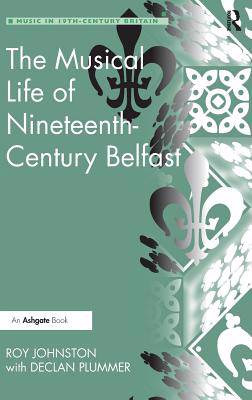
Je cadeautjes zeker op tijd in huis hebben voor de feestdagen? Kom langs in onze winkels en vind het perfecte geschenk!
- Afhalen na 1 uur in een winkel met voorraad
- Gratis thuislevering in België vanaf € 30
- Ruim aanbod met 7 miljoen producten
Je cadeautjes zeker op tijd in huis hebben voor de feestdagen? Kom langs in onze winkels en vind het perfecte geschenk!
- Afhalen na 1 uur in een winkel met voorraad
- Gratis thuislevering in België vanaf € 30
- Ruim aanbod met 7 miljoen producten
Zoeken
Omschrijving
Roy Johnston and Declan Plummer provide a refreshing portrait of Belfast in the nineteenth century. Before his death Roy Johnston, had written a full draft, based on an impressive array of contemporary sources, with deep and detailed attention especially to contemporary newspapers. With the deft and sensitive contribution of Declan Plummer the finished book offers a telling view of Belfast's thriving musical life. Largely without the participation and example of local aristocracy, nobility and gentry, Belfast's musical society was formed largely by the townspeople themselves in the eighteenth century and by several instrumental and choral societies in the nineteenth century. As the town grew in size and developed an industrial character, its townspeople identified increasingly with the large industrial towns and cities of the British mainland. Efforts to place themselves on the principal touring circuit of the great nineteenth-century concert artists led them to build a concert hall not in emulation of Dublin but of the British industrial towns. Belfast audiences had experienced English opera in the eighteenth century, and in due course in the nineteenth century they found themselves receiving the touring opera companies, in theatres newly built to accommodate them. Through an energetic groundwork revision of contemporary sources, Johnston and Plummer reveal a picture of sustained vitality and development that justifies Belfast's prominent place the history of nineteenth-century musical culture in Ireland and more broadly in the British Isles.
Specificaties
Betrokkenen
- Auteur(s):
- Uitgeverij:
Inhoud
- Aantal bladzijden:
- 353
- Taal:
- Engels
- Reeks:
Eigenschappen
- Productcode (EAN):
- 9780754663256
- Verschijningsdatum:
- 28/11/2015
- Uitvoering:
- Hardcover
- Formaat:
- Genaaid
- Afmetingen:
- 156 mm x 234 mm
- Gewicht:
- 734 g

Alleen bij Standaard Boekhandel
+ 580 punten op je klantenkaart van Standaard Boekhandel
Beoordelingen
We publiceren alleen reviews die voldoen aan de voorwaarden voor reviews. Bekijk onze voorwaarden voor reviews.









